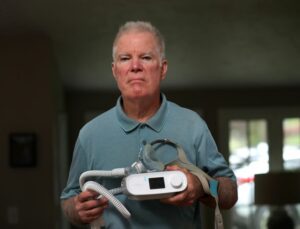CPAP Defective Product Recall Attorneys in Montana

Philips Respironics has issued a recall for Philips Bi-Level Positive Airway Pressure (Bi-Level PAP), Continuous Positive Airway Pressure (CPAP), and mechanical ventilator devices after potential health risks related to lung injury have been identified. The company may be facing multiple lawsuits filed by people who were injured by the devices.
People who have suffered:
- Airway irritation or inflammation
- Breathing difficulty
- Lung Damage
- New or worsening asthma
- Pneumonia
- Lung cancer
- Kidney cancer
- Liver cancer
- Colon cancer
- Heart attack/heart failure
- Stroke
- Respiratory failure
- Liver disease
- Kidney disease
after using a Philips Bi-Level Positive Airway Pressure (Bi-Level PAP), Continuous Positive Airway Pressure (CPAP) or mechanical ventilator device may be eligible for compensation and should seek legal assistance.
Philips Recalls Millions of CPAP and Other Breathing Machines
The voluntary recall announcement issued in June 2021 is a follow-up to a previous notification from April 2021. The recall involves millions of sleep apnea and ventilator devices which may increase the risk of lung injury and cancer due to inhalation foam particles and outgassing of toxic chemicals. Philips estimates that 3 to 4 million devices may be affected, the majority of which are first-generation DreamStation products sold before April 2021.
Recalled Philips Devices Include:
CPAP and BiLevel PAP
Continuous Ventilator, Non-life Supporting
- DreamStation ASV
- DreamStation ST, AVAPS
- SystemOne ASV4
- C Series ASV, S/T, AVAPS
- OmniLab Advanced Plus In-Lab Titration Device
Non-continuous Ventilator
- SystemOne Q series
- DreamStation CPAP, Auto CPAP, BiPAP
- DreamStation Go CPAP, APAP
- Dorma 400, 500 CPAP
- REMStar SE Auto CPAP
Mechanical Ventilators
Continuous Ventilator
- Trilogy 100 Ventilator
- Trilogy 200 Ventilator
- Garbin Plus, Aeris, LifeVent Ventilator
- Continuous Ventilator, Minimum Ventilatory Support, Facility Use
- A-Series BiPAP V30 Auto Ventilator
Sound-reducing Foam Liner May Be to Blame
The recalled Philips CPAP and ventilator devices have been linked to an increased risk of airway contamination, chemical exposure, and possible cancer. The problem is related to polyester-based polyurethane (PE-PUR) foam which is a sound-abatement component of certain models of the devices.
PE-PUR sound abatement foam may degrade into particles, entering into the device air pathway, to be inhaled or ingested. In addition, the foam may be prone to “off-gas” chemicals which may be toxic. Philips had indicated that foam degradation may be exacerbated by unapproved cleaning methods including high heat, high humidity, and ozone cleaning environments.
Philips CPAP Injury Lawsuit
Some consumers have found black debris in the breathing tubes and have reported feeling sick with symptoms such as headache, inflammation, breathing problems, irritation, nausea, and other potential toxic effects. Inhalation of toxic chemicals may also increase the risk of cancer.
People who have suffered lung injury or cancer after using a Philips Bi-Level Positive Airway Pressure (Bi-Level PAP), Continuous Positive Airway Pressure (CPAP) or mechanical ventilator device may be eligible for compensation and should seek legal assistance. Contact the CPAP recall injury attorneys at Heenan & Cook for a free and confidential review of your potential claim.


